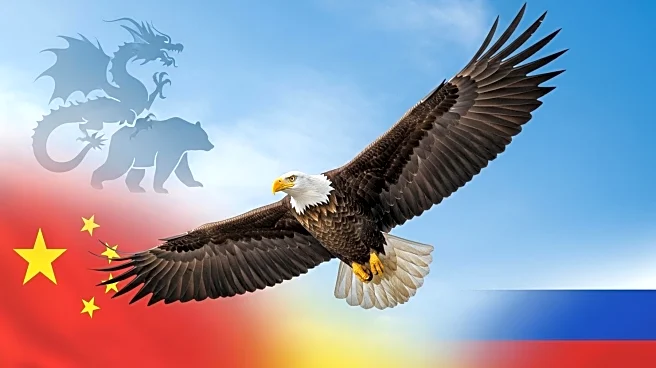What's Happening?
President Trump has dismissed concerns that the warming relations between China, Russia, and their allies pose a challenge to the United States on the global stage. In a statement, Trump emphasized his strong relationship with Chinese President Xi Jinping, asserting that China needs the U.S. more than the U.S. needs China. This comes as Xi prepares to host world leaders, including North Korea's Kim Jong Un and Russia's Vladimir Putin, at a Victory Day parade in Beijing, showcasing China's military might. Trump also expressed confidence in the U.S. military's strength, stating that it is the most powerful in the world and that adversaries would not dare to use military force against the U.S. Additionally, Trump voiced disappointment in Putin over the failure to reach a peace deal for Ukraine during their recent meeting.
Why It's Important?
The alignment between China, Russia, and other non-Western nations could signify a shift in global power dynamics, potentially challenging U.S. influence. Trump's dismissal of these concerns highlights his focus on maintaining strong bilateral relations with China despite geopolitical tensions. The U.S. military's perceived strength serves as a deterrent against potential threats, reinforcing national security. However, the lack of progress in peace negotiations with Russia over Ukraine remains a critical issue, affecting international stability and U.S. foreign policy. The situation underscores the complexities of global diplomacy and the strategic balancing act required to navigate these alliances.
What's Next?
As China hosts the Victory Day parade, the international community will closely monitor the interactions between Xi, Kim, and Putin, assessing any implications for global alliances. The U.S. may continue diplomatic efforts to address the Ukraine conflict, potentially increasing support for Ukraine. Observers will watch for any shifts in U.S. policy towards China and Russia, especially in trade and military cooperation. The evolving geopolitical landscape may prompt further strategic discussions among U.S. policymakers to safeguard national interests.
Beyond the Headlines
The strengthening ties between China and Russia could lead to long-term shifts in global alliances, challenging Western dominance. This development raises ethical questions about the role of military power in international relations and the potential consequences of such alliances on global peace. The cultural and ideological differences between these nations and the West may further complicate diplomatic efforts, requiring nuanced approaches to foster cooperation and prevent conflict.









